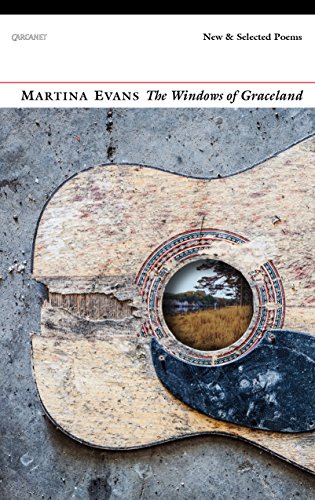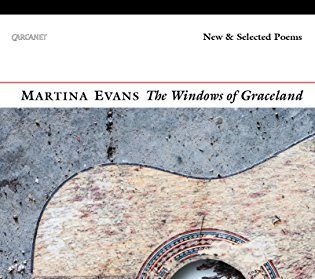Carla Manfredino reviews The Windows of Graceland, Martina Evans‘ unique and personal collection of poems both old and new.
 There is a palpable layering to the poems in Martina Evans’ The Windows of Graceland; people, animals, places and objects crop up throughout, creating a world that is unique to the author. The familiar faces and signs appear in different contexts and acquire new meaning. Evans gives as much as she retains and each poem’s meditation is held at a certain angle, as though we are looking in at it through a window.
There is a palpable layering to the poems in Martina Evans’ The Windows of Graceland; people, animals, places and objects crop up throughout, creating a world that is unique to the author. The familiar faces and signs appear in different contexts and acquire new meaning. Evans gives as much as she retains and each poem’s meditation is held at a certain angle, as though we are looking in at it through a window.
The collection begins with the poem ‘Fine Gael form a coalition government with labour, March 1973’, (from New Poems), setting the tone for the recurring themes. Evans draws from the particular, “They never seemed close – the old whiskey/Master and the young pastel-lipped teacher”, and opens out to political events both local and global: “Daddy’s smile drew a line back to the/ twenties, to the Civil War”. Her experience of growing up in a pub in the Irish town Burnfort, “Las Vegas”, is fertile ground for the shift between the personal and public. These spheres can inform one another; in the poem a photograph of Michael Collins, “The Big Fella”, is draped with her father’s IRA medal on the mantelpiece.
The poems are marked by their open, conversational tone and the subtly orchestrated assonances and rhythms. Music and meaning are inseparable in Evans’ poetry, such as the rising dipthongs in ‘The black priest’: “pirates”, “island”, “giant”, “Irish”. And again in the title poem, ‘All alcoholics are charmers’, about an alcoholic father where the dimeter reflects the emptiness and extremes of addiction. Often the speaker is a quiet young woman who doesn’t voice her desires, “Fenian/ bitch, he said and I put/ my hand over my mouth”, (‘One evening in July’), but she isn’t without wit:
Papist was the next queer
word he came out with
and he ran out, looking awful
upset before I had time
to tell him that I’d just recently
become an atheist.
Evans draws an analogy between cows and women in the short feminist poem ‘Cows’. The first line has the greater syllables, ‘are mostly silent’, and the final line is a monosyllable, lending the poem an ourosboro-like bite as it ends: “all women dread/ to be called/ cows”.
The spindly free verse poem is Evans’ default form, which can be repetitive in a book of this length. But there are occasional experiments with other structures; the tercets are a fine move in ‘Everything including this room is a future ruin’, where the enjambed, short lines crumble into the next. The poem is suddenly end-stopped and Donny the cat is “gone.”. The two Mother monologues are apt shapes to explore the internal conflicts and contradictions within a religious social setting.
Looking in at something through a window isn’t an accurate or absolute view. Evans said in an interview for The Irish Times that she mixes the fictive with the autobiographical in her poems, similar to what Wallace Stevens called ‘supreme fiction’. The metamorphosing voices in The Windows of Graceland speak through inventive, various guises: the father is a desperate alcoholic in the first section of the book, “whiskey headed, tobacco fingered” and later in ‘Burnfort, Las Vegas’, he’s a docile man who escapes from his overbearing wife to be with his cats. It also shows that paradoxes are inherent to the human condition, as is our capacity to mutate.
‘On living in an area of manifest greyness and misery’ takes its title from Peter Ackroyd’s ‘London: The Biography’ (2000). Despite the glum title, the poem froths with life in the metropolis: the city is an “ocean/ especially the sound of rushing wheels/ when it rains”, the tidal waves of traffic “rock the bed/ and put me to sleep”, while police sirens “shriek up and down all day/ like seagulls chasing sandwiches”. Having the experience of provincial life serves Evans well, as she creates some unique similes that conjugate more than contrast.
The titular poem from ‘Can dentists be trusted?’ has mercenary overtones, “if they are private/ they may want all of your teeth” and makes a Hellenistic simile out of being at the hands of a dentist:
you could find yourself
opening wide
while laid out on the chair
like a corpse
with a gold coin
in its mouth
travelling towards the
underworld.
Facing the Public (2009) is overtly given to poeticise political and religious matters, rather than the personal. These poems are shocking and relevant, “Omar at twelve,/ wiring explosives laid out like cakes” (‘Omar Khadr’), but occasionally prosaic. ‘Reprisal’ reads like an overheard conversation with the common phrase “No more than he was a dog.” as its refrain. Wounds that are “red as blooming poppies”, is an appropriate simile, but lacks the originality of Evans’ unique imagery elsewhere. It is difficult to make poetry out of war, but it isn’t impossible as ‘The fiftieth anniversary of the Easter Rising’ finely demonstrates. The poem is separated into two circuitous sonnet-like stanzas that mirror one another, showing how trauma and history repeat themselves.
The village of Burnfort is ‘like New York’ and the American influence in the sixties is seen in the poems as cowboys, actors and objects synonymous with Americana. There is also the influence of its literature, with a quote from Walt Whitman, a poem called ‘I want to be like Frank O’Hara’, and the Charles Simic-like shoe poems, where she explores a mother-daughter relationship through the personification of shoes, “so chic/ she was afraid that they’d speak to her” (‘The Mystery of Shoes’). The collection ends with ‘The Green Storybook’, a short poem about Enid Blyton’s influence and again shows how the personal can speak volumes about modern life, especially as a writer: “the black marks straightening themselves/ out into sense across the page, saying this way, this way/ you’ll escape.”
Carla Manredfino has written on a selection of poets for Wales Arts Review.











